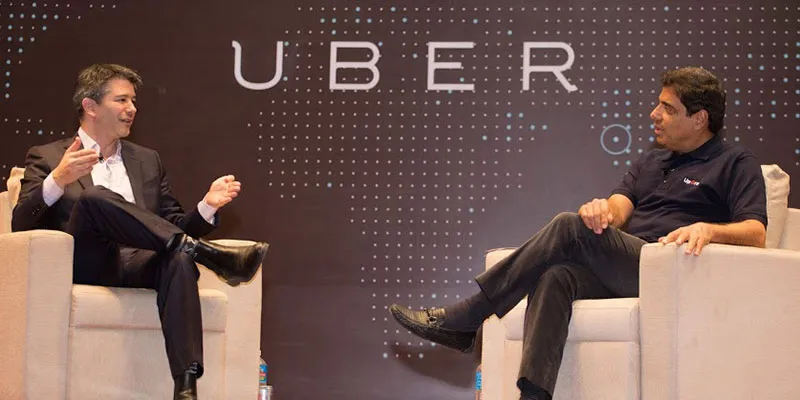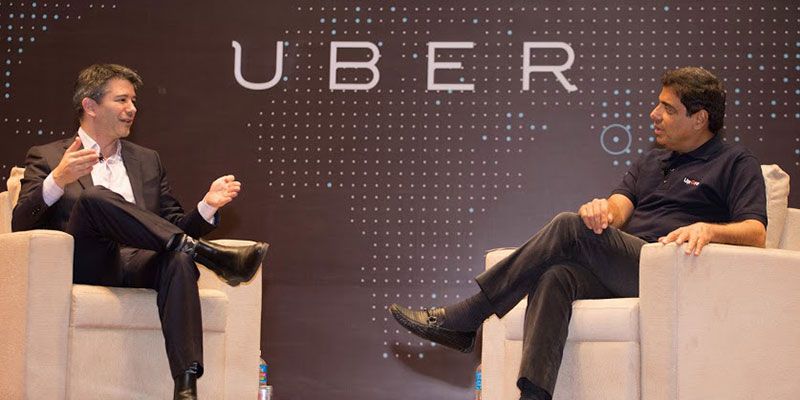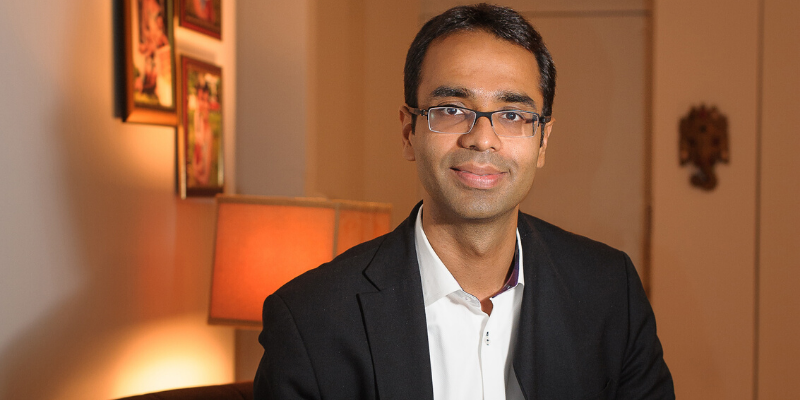Uber's Travis Kalanick on jugaad, chess and entrepreneurship at IIT-B
Travis Kalanick, CEO and Founder of Uber, in a fireside conversation with Ronnie Screwvala, the ex-CEO and Founder of UTV group, organised by E-cell, IIT Bombay
The interactive session organised by E-Cell, IIT Bombay on January 19 started off by some videos about some of the creative initiatives at Uber. Travis Kalanick, the CEO and Founder of Uber, was introduced by Ronnie Screwvala in a convocation hall jam packed with students and some entrepreneurs.

A show of hands from the audience showed there were a lot of budding entrepreneurs in the hall eager and excited to listen to Travis's entrepreneurial journey.
Tackling failure as an entrepreneur
Ronnie asked Travis about what he thinks about failure and how should one tackle failure in the entrepreneurial journey. Talking about his previous startup experience, Travis said that it is inevitable to face failure in the journey of an entrepreneur, but the learning experience is the key. He also said that before Uber, he was sued for quarter of a million dollars and his company shut down. He said that failure meant not putting in 100 per cent effort and being scared in the journey.
About tackling failure, Travis stressed on the fact to have a ‘champion mindset’ while assessing the risks at hand. "Put everything that you have on the field, every ounce of energy and passion that you have. And when you get knocked down, because inevitably you will, get back up. And if you put everything in and keep getting back up, it's very hard to fail. We can only bend reality, not break it," he added.
Trigger for innovations
Ronnie then asked Travis about the reason for the trigger for innovations and the positivity in the startup ecosystem change in India. Travis expressed that he had seen a lot of changes in the startup ecosystem in India – with funding going global and global investors investing in India a lot more today than previously. Travis mentioned three bays – Bay Area, Beijing, and Bengaluru as global tech hubs. Speaking about the quality and the number of graduates from IITs, he said that engineers are better entrepreneurs because of their ability to break down a problem and build it together piece by piece.
When asked about his experience at the Startup India conference, Travis expressed that he felt the positive energy. He also hailed the PM Narendra Modi about him being proactive and present in San Jose four months ago and having interactions along with the CEO of Google and Microsoft.
Message to budding entrepreneurs
When asked to give a message to the budding entrepreneurs, Travis said that it is all about looking at the world with a curious mindset, finding problems, and solving them. He added
You should fall in love with the idea, be a good storyteller to capture people's imagination, and have the guts to go out and try it. Push it till it hurts and somebody else goes wow on your idea. Put yourself into it.
Travis said
Communicating your idea is a key. As an entrepreneur, you have limited resources at hand and you have to make it happen. A lot of 'jugaading' will definitely help. Every dollar should be spent efficiently and it is only worth spending money for a positive ROI. It is a statistical probabilistic approach.
On investors and playing chess
Travis had an interesting take on investors while starting up. Talking about a success plan versus survival plan, he drew up an analogy between a startup's journey and playing chess.
Investors do not know to play chess. They give you suggestions on what to do next. Be a good listener. But as an entrepreneur, you should convince them otherwise about your thought process and become an expert chess player.
A brief audience interaction
The interactive session was followed by some audience questions. Undergraduate students had questions for Travis while he got candid asking them if they planned to drop out and start something of their own. When asked about Uber in India, Travis was very positive about the growth with increasing number of smart phone users stressing on the fact that the current mission of Uber is to provide reliable transportation for everyone.
Citing an example from his earlier startup, Travis said that during his visit to India eight years back, he spent time on the beach at Thiruvananthapuram coding with his cofounders.
Travis then talked about how different it was in China – the cost and competition.
When asked about the Uber culture and the importance of culture in a startup, Travis stressed on the fact that initially while starting up, it isn’t necessary; however, while growing and scaling up to a team of 100s and 1000s, it becomes necessary to build a culture so that each and every one resonates to achieve the mission of the startup.







![[TechSparks 2020] Robust tech and architecture helps Zoom support over 3 trillion meeting minutes in a year](https://images.yourstory.com/cs/2/a9efa9c02dd911e9adc52d913c55075e/Screenshot2020-10-30at2-1605004421972.png)
![[Funding alert] Online meat startup FreshToHome raises $121M in Series C led by IDC](https://images.yourstory.com/cs/2/a9efa9c02dd911e9adc52d913c55075e/Image4nsc-1582624654197.jpg)
![[TechSparks] Ravi Shankar Prasad, Nirmala Sitharaman, Byju Raveendran and more, on Day 3 of TechSparks 2020](https://images.yourstory.com/cs/2/9456dfb02d6c11e9aa979329348d4c3e/Imageczys-1603802043487.jpg)
![[Funding alert] Insuretech startup Ensuredit raises Rs2.5 Cr led by Venture Catalysts](https://images.yourstory.com/cs/2/25e9e0e0605211e984534d4121ad4bb6/V-05-1600852077699.png)
